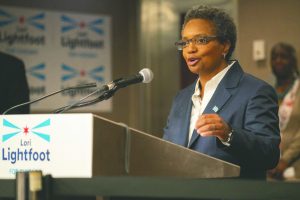Lightfoot announces State of City address, town halls
Chronicle Media — August 27, 2019Chicago Mayor Lori Lightfoot has announced that the city will hold events to update residents on key issues facing the city and begin a discussion on how the administration plans to address them.
Lightfoot will provide an overview of the 2020 budget forecast by outlining the city’s existing long-term liabilities and future fiscal needs as well as ideas the city is considering for addressing its deficit. The mayor will outline those items in a primetime speech Aug. 29.
In September, the mayor will lead four budget town-hall meetings to ensure residents have an opportunity to learn about the budget process, 2020 budget, and some ways the city will address its financial challenges.
“As we work to build a city government that drives growth and opportunity for all of its residents and neighborhoods, we must ensure we have a road map to a sustainable financial future,” Lightfoot said. “With the city facing financial challenges this year, it is crucial that we have an open and honest conversation with residents from across the city, as well as with departments, city leaders and other stakeholders to develop solutions that will make our government stronger and work more efficiently for all of our neighborhoods.”
The State of the City address will be broadcast and live-streamed from Harold Washington Library at 6 p.m. Aug. 29. To ensure all interested residents have a chance to tune in, the speech will be carried on local television and radio newscasts, with the city of Chicago providing a live-stream feed from its website and its social media channels. Additionally, the city will provide translation services in Spanish.
The mayor’s speech is expected to focus on her administration’s vision for a long-term financial plan and investments to strengthen communities for working families. The speech will align with the release of the 2020 Budget Forecast. Similar to previous forecasting done by the Annual Financial Analysis, the 2020 Budget Forecast will include a historical picture of the city’s finances, current costs and obligations, and future cost projections. The release of the document will serve as a tool as the city works on challenges in 2020.
“As the Budget Office works closely with city departments to identify their operational needs and service investments for the coming year, we also want to hear from residents, elected officials and other key stakeholders as we develop strategies for addressing our fiscal challenges,” said Susie Park, the city’s budget director. “By creating more lines of communication with the public about the state of our finances, we are creating more opportunities to solicit feedback and ensuring that more voices are heard.”
To illuminate considerations from residents for next year’s budget, and to gain insight on where the public wants to reduce and increase spending, the city will conduct four targeted Budget Town Hall meetings, including one youth-focused budget discussion. All Budget Town halls will be carried on a live-stream and will allow for virtual participation over social media.
Budget Town halls will be:
- North – Sept. 4 from 6-8 p.m. at Copernicus Center, 5216 W. Lawrence Ave.
- West – Sept. 14 from 9-11 a.m. at Roberto Clemente High School, 1147 N. Western Ave.
- Southeast – Sept. 19 from 6-8 p.m. at Southeast United Methodist Youth and Community Center (The Zone), 11731 S. Avenue O.
- South (Youth) – Sept. 25 from 6-8 p.m. at Lindblom Math and Science Academy, 6130 S. Wolcott Ave.
To give the Budget Town Hall meetings a framework of the topics residents want to discuss or learn about, the city is launching a new public survey at www.chicago.gov/2020budget. Through Sept. 30, the survey will act as a tool for the administration to ascertain which priorities residents will want to focus on over the course of the discussion and will survey residents on topics ranging from public safety and infrastructure; to neighborhood services and public health.
As the city prepares for the 2020 budget process, Lightfoot said her administration has taken concerted efforts over the past several weeks to work with departments to find internal savings and ways to operate more efficiently. That includes measures to reduce an open line of short-term borrowing which it anticipates will save $22 million in fiscal year 2020, as well as reforms to the workers’ compensation program, which are expected to eventually drive down claims costs and produce savings for the city. Savings and efficiencies will be identified to reduce FY 2020 costs and ensure a more viable financial future for all of Chicago, Lightfoot said.
For updates and details on the State of the City address and Budget Town halls, visit www.chicago.gov and follow the city on Facebook and Twitter.








